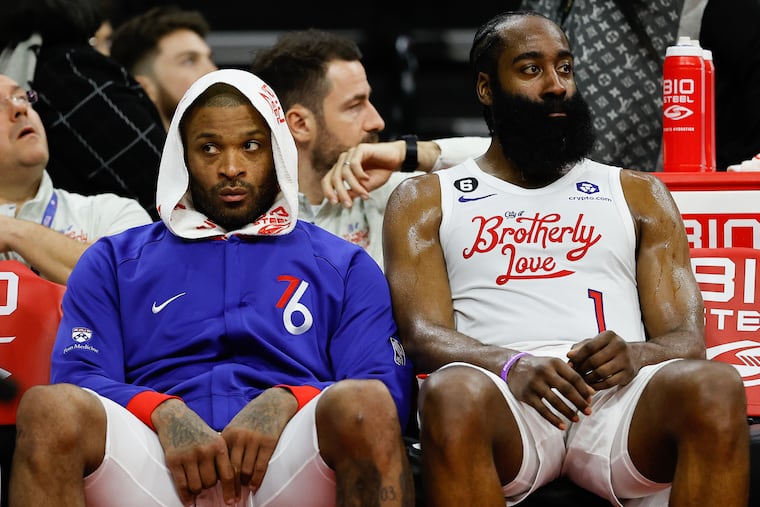P.J. Tucker on the disappointing start to his Sixers tenure and fourth-quarter benchings: ‘I’ve just got to figure it out’
Tucker, a veteran and celebrated offseason acquisition, has struggled so far in his first season with the Sixers — and has recently has been benched during fourth quarters.

SALT LAKE CITY — During the final minutes of the 76ers’ home loss to the Oklahoma City Thunder on Thursday, P.J. Tucker sat on the bench, towel draped over his head.
The image has become increasingly common in fourth quarters, and encapsulated the disappointment of Tucker’s Sixers tenure so far. The veteran forward — and celebrated summer acquisition because of his reputation for defense, toughness and championship pedigree — acknowledged the regular season’s first half was “not as good as I wanted it to be.” That he has logged three total fourth-quarter minutes in his past five games played entering Saturday night at the Utah Jazz has forced him to balance the “natural human emotion” of the demotion with allowing “coaches be coaches and do what they feel like is best.”
Tucker also repeatedly said during a Saturday morning conversation with The Inquirer that it’s up to him to “figure it out” as his team begins a crucial five-game Western Conference road trip.
“Being who I am and being a guy that proved to my previous coaches where it’s like I can’t not be on the floor,” Tucker said, “to being in a position I’ve never been in, where I’m not playing, and I’ve still got to stay positive. You’ve still got to be professional.
“It’s a push and pull of everything ... of what you’re used to and what your job is, what you came here for.”
» READ MORE: Sixers mailbag: ‘Is there any chance to see De’Anthony Melton in the starting lineup instead of P. J. Tucker?’
Tucker is playing for his third team in less than two calendar years, after he was traded to the NBA title-bound Milwaukee Bucks at the 2021 deadline and spent last season with a Miami Heat team that finished with the Eastern Conference’s best regular-season record. Yet, the 37-year-old forward said it’s been particularly challenging to find his footing on this Sixers team, especially because of the numerous lineup changes due to various roster health issues. Tucker entered Saturday averaging 3.3 points per game — his lowest mark since averaging 1.8 in 17 games as a rookie in 2006-07 — and 4.3 rebounds in 27.2 minutes per game.
“It’s different on other teams, when you’ve been there and you’ve kind of molded your space on the team and your identity is set,” Tucker said. “It’s a lot easier. ... No two days have been the same [with the Sixers]. Every game has been different.
“It’s a weird spot where I’ve just got to figure it out. That’s where I’m at with it. There’s no other way to explain it.”
Tucker has never been a potent scorer, averaging 6.9 points on 5.9 field-goal attempts during his 12-year career entering Saturday. But he has recognized, on this roster, “I’m not going to get the looks” that he received at previous stops, when he became a prolific corner three-point shooter in addition to his more under-the-radar role-player duties, such as keeping possessions alive by grabbing offensive rebounds and loose balls and getting physical while defending opponents of all sizes. He had taken one or zero shots in 11 out of 39 games played entering Saturday, and went scoreless in 12.
He has also caught wind of outside criticism for the lack of offensive production, responding with a “smile and laugh.”
“They talk about how much I don’t score,” Tucker said. “Can you imagine playing 30 minutes and taking one shot? Maybe not shooting at all? And still having to guard the best player and do all the dirty stuff, knowing that you’re not going to get what the normal reward is of being able to shoot the ball and play offense, which everybody wants to do?
“That’s a job. That’s not something somebody just chooses throughout the NBA.”
» READ MORE: At NBA’s halfway mark, the Sixers sit in a solid position in the wide open Eastern Conference
Yet this is the first time since Tucker established himself as a key rotation player that he has not been a crunch-time regular for a significant stretch. He said he and coach Doc Rivers have not had explicit conversations about the reasoning for the lack of fourth-quarter minutes. Rivers, though, said before Saturday’s game that he will tend to lean toward a closing lineup with three guards, including perimeter defensive pest De’Anthony Melton.
“If there’s someone for P.J. to guard, I’ll say, then we need him on the floor,” Rivers said. “If there’s no one for him to guard, then we will go with more smalls. It just depends on the night. We’re lucky. We have seven or eight guys that can be in the closing lineup. That’s a good thing.”
One positive: Tucker said his health has been improving. The sinus infection that kept him out of last Sunday’s win at the Detroit Pistons is clearing up. The nerve issue in his neck is an “everyday process” he continues to manage.
So Tucker will keep trying to figure it out. He believes that quest could also be applied to his team, which has played less than 10 games with its opening night starting lineup and could be without Tobias Harris and Georges Niang against the Jazz.
“That’s the scary part of still being pretty damn good,” Tucker said of the Sixers, who entered Saturday with a 25-16 record, “to feel like we haven’t even scratched the surface with the talent we have on this team.
“We can match up across the board with anybody across the league — period.”